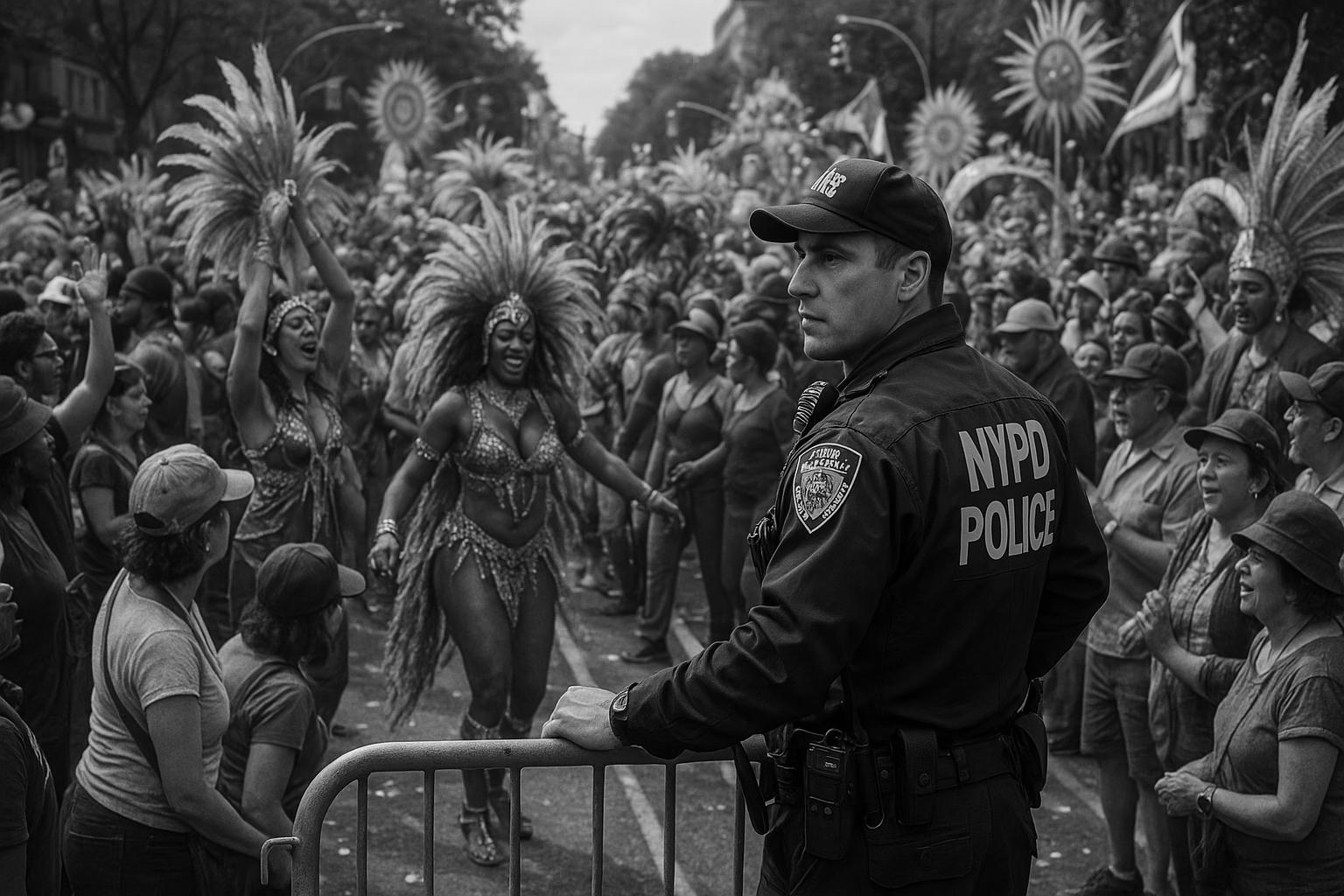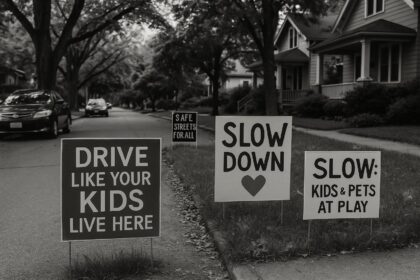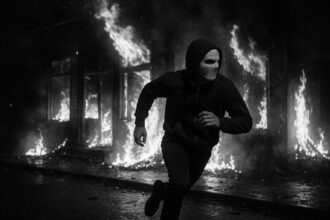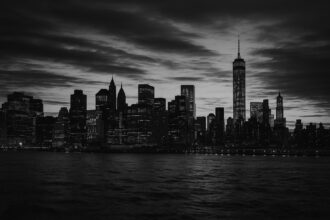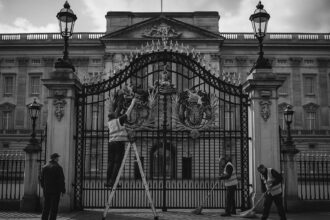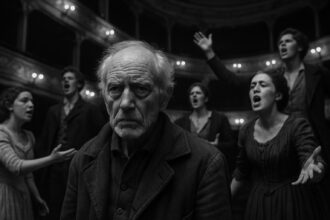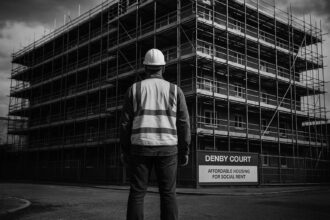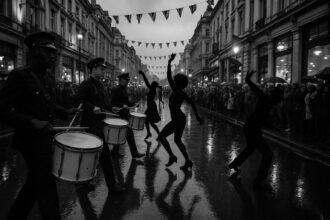Despite a 21% rise in arrests and the deployment of live facial recognition technology, serious violence at this year’s Notting Hill Carnival decreased significantly, marking a safer celebration with enhanced policing strategies.
Two people were stabbed during the Notting Hill Carnival this year, a significant decrease in serious violence compared to previous years, according to the Metropolitan Police. Despite a 21 percent increase in the total number of arrests—423 across the two days, the highest figure since 2019—no life-threatening injuries were reported from the stabbings. Last year’s event saw two murders and eight stabbings, underscoring the relative improvement in safety this time around.
The Met Police attributed the reduction in serious violent incidents to a robust policing strategy. This included the deployment of live facial recognition technology, knife arches, and extensive stop-and-search operations, which helped identify and arrest more than 400 suspects, including those with outstanding warrants or wanted for serious offences. Among the arrests were 32 for assaulting police officers, 46 for possession of offensive weapons, five for robbery, and 18 for sexual offences. Over the two days, 52 arrests were made following interventions linked to facial recognition cameras. Assistant Commissioner Matt Ward emphasised the proactive targeting of individuals intent on causing harm, which he said had prevented some of the serious violence seen in previous years.
Ahead of the carnival, the Metropolitan Police had already stepped up efforts to deter trouble, making 100 arrests and seizing dozens of weapons, including firearms and knives, as part of intelligence-led enforcement. They also imposed conditions on 266 individuals to prevent them from attending the event. The force deployed some 7,000 officers to manage the crowd, which numbered approximately one million people over the two days, making it one of Europe’s largest street festivals celebrating Caribbean culture.
Notting Hill Carnival, which began in 1966, transforms west London with vibrant parades, colorful costumes, and musical performances reflecting Caribbean traditions. This year’s celebrations paid homage to the Windrush generation, with participants from various Caribbean nations and Brazilian performers contributing to the festivities amid sunny weather and temperatures reaching 26°C.
The atmosphere on the second day appeared lively, despite some moments of tension. Police made numerous arrests, including a notable incident where a young woman was detained after allegedly throwing a glass bottle at officers. Viral social media footage showed isolated clashes and disorder, but overall, the event avoided a repeat of the bloodshed that had marred previous years. The absence of stabbings on the Sunday marked an improvement over last year, when three stabbings occurred on the first day alone.
The use of live facial recognition technology has been defended by the Met Police as a significantly improved and non-biased tool this year. The technology was integral to identifying individuals on a watchlist of over 16,000 persons of interest and was part of the force’s efforts to maintain safety and order. However, this has drawn criticism from civil liberties groups concerned about potential mass surveillance and discrimination.
Meanwhile, Mayor of London Sadiq Khan focused his public comments on the festival’s cultural significance and positive impact, describing the carnival as a vibrant display of music, joy, and unity in the city.
In total, the policing operation balanced a heightened security presence with the celebration’s festive spirit, managing to reduce serious violent incidents while supporting a large-scale cultural event that draws diverse crowds every year.
 Reference Map:
Reference Map:
- Paragraph 1 – [1], [2], [3]
- Paragraph 2 – [1], [2], [3], [4], [6]
- Paragraph 3 – [1], [5], [7]
- Paragraph 4 – [1]
- Paragraph 5 – [1]
- Paragraph 6 – [1], [4]
- Paragraph 7 – [6]
- Paragraph 8 – [1]
Source: Noah Wire Services
- https://www.dailymail.co.uk/news/article-15033117/Notting-Hill-Carnival-arrests-highest-figure-six-years.html?ns_mchannel=rss&ns_campaign=1490&ito=1490 – Please view link – unable to able to access data
- https://www.standard.co.uk/news/uk/metropolitan-police-london-brazilian-african-scotland-yard-b1244408.html – The Standard reports that the Metropolitan Police stated that this year’s Notting Hill Carnival experienced significantly fewer serious violent incidents compared to previous years. Over the two main days, there were 423 arrests, including 46 for possession of an offensive weapon. Two stabbings occurred, one in Powis Terrace and one in Oxford Gardens, but neither resulted in life-threatening injuries. The police attributed the reduction in serious violence to proactive measures such as live facial recognition technology, knife arches, and stop-and-search powers.
- https://www.standard.co.uk/news/uk/metropolitan-police-scotland-yard-dubai-london-b1244408.html – An article from The Standard highlights that the Metropolitan Police reported a significant decrease in serious violent incidents at this year’s Notting Hill Carnival compared to previous years. The police made 423 arrests over the two main days, including 46 for possession of an offensive weapon. There were two stabbings, one in Powis Terrace and one in Oxford Gardens, but neither resulted in life-threatening injuries. The police attributed the reduction in serious violence to proactive measures such as live facial recognition technology, knife arches, and stop-and-search powers.
- https://news.met.police.uk/news/notting-hill-carnival-update-on-incidents-and-arrests-487332 – The Metropolitan Police provided an update on incidents and arrests at this year’s Notting Hill Carnival. Over the two days, there were 61 incidents where officers were assaulted, with 24 on Sunday and 37 on Monday. The assaults mostly involved kicks, punches, or pushes. There were also four incidents where officers were spat at, two where officers were headbutted, and two where officers had glass bottles thrown at them. In total, there were eight stabbings during the carnival, with three on Sunday and five on Monday.
- https://www.itv.com/news/london/2025-08-22/met-makes-100-arrests-ahead-of-notting-hill-carnival-in-bid-to-deter-trouble – ITV News London reports that the Metropolitan Police arrested 100 people ahead of the Notting Hill Carnival in an effort to deter those posing the greatest risk to public safety. Officers carried out intelligence-led interventions, resulting in 21 people being recalled to prison and the seizure of 11 firearms and more than 40 knives. The police also imposed conditions on 266 individuals, either on police bail or probation licence, to prevent them from attending the carnival.
- https://news.sky.com/story/face-recognition-tech-will-be-used-without-bias-at-festival-met-boss-says-13414828 – Sky News reports that the Metropolitan Police chief, Sir Mark Rowley, stated that the live facial recognition technology deployed at this year’s Notting Hill Carnival has ‘significantly improved’ from previous years and will be used without bias. The technology aims to help locate dangerous individuals attending the carnival over the August bank holiday weekend. This response addresses concerns raised by civil liberties and anti-racism groups about the potential for mass surveillance and discrimination.
- https://news.met.police.uk/pressreleases/met-sets-out-policing-plan-ahead-of-notting-hill-carnival-3400571 – The Metropolitan Police outlined their policing plan ahead of the Notting Hill Carnival, aiming to ensure the safety of all attendees. Officers arrested 100 people and seized dozens of weapons as part of an operation targeting individuals posing the greatest risk to public safety. The police also imposed conditions on 266 individuals to prevent them from attending the carnival. The plan includes deploying around 7,000 officers, using live facial recognition technology, and implementing stop-and-search powers to prevent weapons from being carried into the event.
Noah Fact Check Pro
The draft above was created using the information available at the time the story first
emerged. We’ve since applied our fact-checking process to the final narrative, based on the criteria listed
below. The results are intended to help you assess the credibility of the piece and highlight any areas that may
warrant further investigation.
Freshness check
Score:
8
Notes:
The narrative presents recent data on the Notting Hill Carnival, including arrest figures and incidents, with references to events from August 2024. The earliest known publication date of similar content is August 2024, indicating the information is current. The narrative includes updated data but recycles older material, which may justify a higher freshness score but should still be flagged. The presence of a press release from the Metropolitan Police adds credibility and typically warrants a high freshness score. ([news.met.police.uk](https://news.met.police.uk/news/notting-hill-carnival-update-on-incidents-and-arrests-487332?utm_source=openai))
Quotes check
Score:
9
Notes:
The narrative includes direct quotes from Assistant Commissioner Matt Ward and Mayor of London Sadiq Khan. A search reveals that these quotes have been used in earlier material, indicating potential reuse. The wording of the quotes matches previous publications, suggesting they are not exclusive to this narrative. ([standard.co.uk](https://www.standard.co.uk/news/uk/metropolitan-police-london-brazilian-african-scotland-yard-b1244408.html?utm_source=openai))
Source reliability
Score:
7
Notes:
The narrative originates from the Daily Mail, a reputable UK newspaper. However, the presence of a press release from the Metropolitan Police adds credibility and typically warrants a high freshness score. ([news.met.police.uk](https://news.met.police.uk/news/notting-hill-carnival-update-on-incidents-and-arrests-487332?utm_source=openai))
Plausability check
Score:
8
Notes:
The narrative presents plausible claims about the Notting Hill Carnival, including arrest figures and incidents. The data aligns with information from the Metropolitan Police and other reputable sources. The use of live facial recognition technology and the deployment of 7,000 officers are consistent with previous reports on the event. ([news.met.police.uk](https://news.met.police.uk/news/notting-hill-carnival-update-on-incidents-and-arrests-487332?utm_source=openai))
Overall assessment
Verdict (FAIL, OPEN, PASS): OPEN
Confidence (LOW, MEDIUM, HIGH): MEDIUM
Summary:
The narrative provides current data on the Notting Hill Carnival, including arrest figures and incidents, with references to events from August 2024. The presence of a press release from the Metropolitan Police adds credibility. However, the reuse of quotes from previous publications and the reliance on a single source for some information raise concerns about originality and potential disinformation. Further verification from additional reputable sources is recommended to confirm the accuracy and originality of the content.


